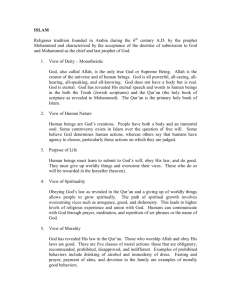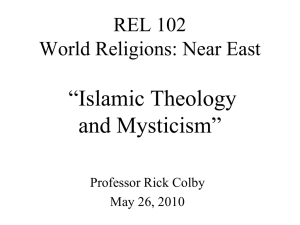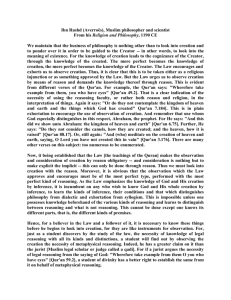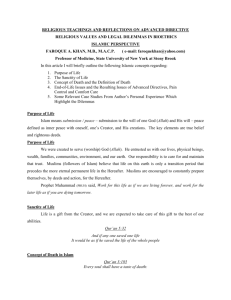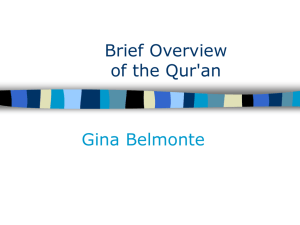Dialogue Women in Islam
advertisement
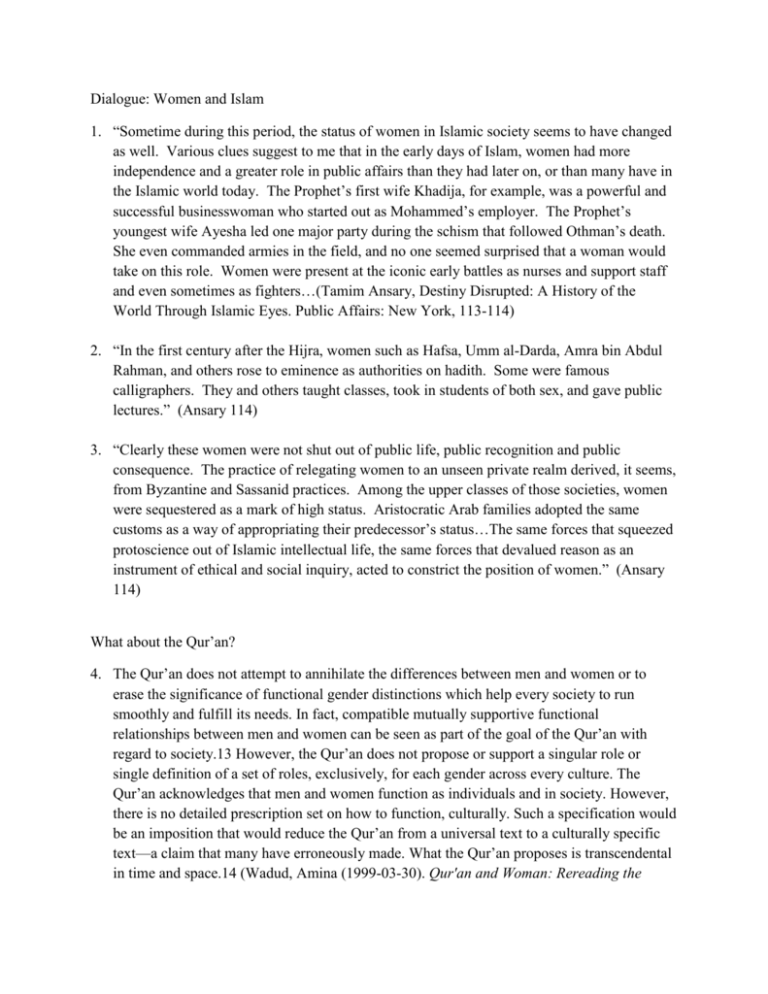
Dialogue: Women and Islam 1. “Sometime during this period, the status of women in Islamic society seems to have changed as well. Various clues suggest to me that in the early days of Islam, women had more independence and a greater role in public affairs than they had later on, or than many have in the Islamic world today. The Prophet’s first wife Khadija, for example, was a powerful and successful businesswoman who started out as Mohammed’s employer. The Prophet’s youngest wife Ayesha led one major party during the schism that followed Othman’s death. She even commanded armies in the field, and no one seemed surprised that a woman would take on this role. Women were present at the iconic early battles as nurses and support staff and even sometimes as fighters…(Tamim Ansary, Destiny Disrupted: A History of the World Through Islamic Eyes. Public Affairs: New York, 113-114) 2. “In the first century after the Hijra, women such as Hafsa, Umm al-Darda, Amra bin Abdul Rahman, and others rose to eminence as authorities on hadith. Some were famous calligraphers. They and others taught classes, took in students of both sex, and gave public lectures.” (Ansary 114) 3. “Clearly these women were not shut out of public life, public recognition and public consequence. The practice of relegating women to an unseen private realm derived, it seems, from Byzantine and Sassanid practices. Among the upper classes of those societies, women were sequestered as a mark of high status. Aristocratic Arab families adopted the same customs as a way of appropriating their predecessor’s status…The same forces that squeezed protoscience out of Islamic intellectual life, the same forces that devalued reason as an instrument of ethical and social inquiry, acted to constrict the position of women.” (Ansary 114) What about the Qur’an? 4. The Qur’an does not attempt to annihilate the differences between men and women or to erase the significance of functional gender distinctions which help every society to run smoothly and fulfill its needs. In fact, compatible mutually supportive functional relationships between men and women can be seen as part of the goal of the Qur’an with regard to society.13 However, the Qur’an does not propose or support a singular role or single definition of a set of roles, exclusively, for each gender across every culture. The Qur’an acknowledges that men and women function as individuals and in society. However, there is no detailed prescription set on how to function, culturally. Such a specification would be an imposition that would reduce the Qur’an from a universal text to a culturally specific text—a claim that many have erroneously made. What the Qur’an proposes is transcendental in time and space.14 (Wadud, Amina (1999-03-30). Qur'an and Woman: Rereading the Sacred Text from a Woman's Perspective (Kindle Locations 570-572). Oxford University Press. Kindle Edition. 5. “Women shall with justice have rights similar to those exercised against them, although men have a status above women. God is mighty and wise” (Wadud) 6. 4:19 “Believers, it is unlawful for you to inherit the women of your deceased kinsmen against their will, or to bar them from re-marrying, in order that you may force them to give up a part of what you have given them, unless they be guilty of a proven sinful act. Treat them with kindness; for even if you dislike them, it may well be that you dislike a thing which God has meant for your own abundant good.” 7. 4:20 “If you wish to replace a wife with another, do not take from her the dowry you have given her even if it be a talent of gold. That would be improper and grossly unjust; for how can you take it back when you have lain with each other and entered into a firm contract?” 8. 4:32 “If you avoid the enormities you are forbidden, We shall pardon you misdeeds and usher you in with all honour. Do not covet the favors by which God has exalted some of you above other. Men shall be rewarded according to their deeds, and women shall be rewarded according to their deeds. Rather implore God to bestow on you his gifts.” 9. 24:30-31 “Enjoin believing women to turn their eyes away from temptation and to preserve their chastity; to cover their adornments (except such as are normally displayed); to draw their veils over their bosoms and not to reveal their finery except to their husbands, their fathers, and their husbands, brothers, sons, the step sons, their women-servants, and their slave girls; male attendants lacking natural vigor, and children who have no carnal knowledge of women. And let them to stamp their feet when walking so as to reveal their hidden trinkets.” 10. Sura 4:34 that "Men are the protectors and maintainers of women, because Allah has made one of them to excel the other, and because they spend from their means. Therefore the righteous women are devoutly obedient and guard in the husband's absence what Allah orders them to guard."




